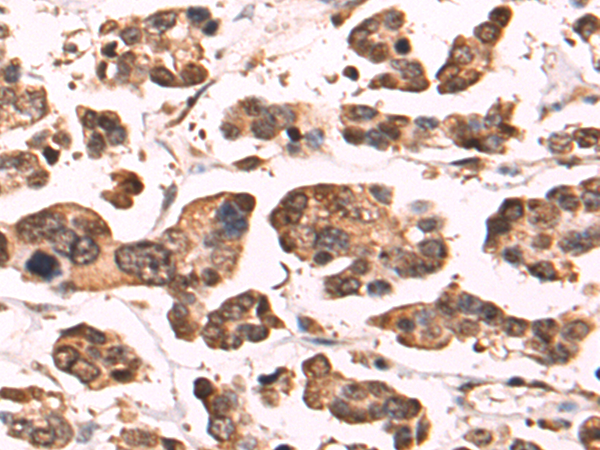
| WB | 咨询技术 | Human,Mouse,Rat |
| IF | 咨询技术 | Human,Mouse,Rat |
| IHC | 1/50-1/200 | Human,Mouse,Rat |
| ICC | 技术咨询 | Human,Mouse,Rat |
| FCM | 咨询技术 | Human,Mouse,Rat |
| Elisa | 1/5000-1/10000 | Human,Mouse,Rat |
| Aliases | CDT2; RAMP; DCAF2; L2DTL |
| Host/Isotype | Rabbit IgG |
| Antibody Type | Primary antibody |
| Storage | Store at 4°C short term. Aliquot and store at -20°C long term. Avoid freeze/thaw cycles. |
| Species Reactivity | Human, Mouse |
| Immunogen | Fusion protein of human DTL |
| Formulation | Purified antibody in PBS with 0.05% sodium azide and 50% glycerol. |
+ +
以下是关于DTL(通常指Cdt2/Dtl)抗体的参考文献,这些文献涉及其在细胞周期调控和癌症中的功能研究:
---
1. **文献名称**:*CRL4Cdt2 regulates cell proliferation and histone gene expression by degrading PR-Set7*
**作者**:Abbas T, et al.
**摘要**:研究利用抗DTL(Cdt2)抗体,揭示了CRL4Cdt2泛素连接酶复合物通过降解PR-Set7蛋白调控细胞增殖和组蛋白表达的机制,证实DTL在DNA复制中的关键作用。
---
2. **文献名称**:*The CRL4-DTL E3 ligase controls cell division through the degradation of p21*
**作者**:Kim Y, et al.
**摘要**:通过免疫沉淀和Western blot分析,使用特异性DTL抗体,阐明CRL4-DTL复合物在细胞周期中降解p21蛋白以促进细胞分裂的分子机制。
---
3. **文献名称**:*DTL/CDT2 is essential for embryonic development and regulates the G1 phase of the cell cycle*
**作者**:Sugimoto N, et al.
**摘要**:研究开发了高特异性抗DTL抗体,并证明DTL在胚胎发育中的必要性,其通过调控G1/S期转换影响细胞周期进程。
---
4. **文献名称**:*Overexpression of DTL promotes hepatocellular carcinoma progression and correlates with poor prognosis*
**作者**:Zhang L, et al.
**摘要**:采用抗DTL抗体的免疫组化技术,发现DTL在肝细胞癌中高表达,且与肿瘤侵袭性和患者生存率下降显著相关。
---
**备注**:DTL(Cdt2/Dtl)是CRL4泛素连接酶复合物的关键组分,上述文献聚焦其在细胞周期调控、DNA修复及癌症中的作用,相关抗体的应用为机制研究提供了重要工具。
DTL antibodies target the DTL (Denticleless E3 Ubiquitin Protein Ligase Homolog) protein, a key regulatory component in cell cycle progression and DNA damage response. Also known as CDT2 or L2DTL, DTL participates in the CRL4^(CDT2) E3 ubiquitin ligase complex, which governs the degradation of cell cycle inhibitors like p21 and SET8. ensuring proper S-phase progression and genomic stability. Its role in DNA replication licensing and repair has linked DTL dysregulation to oncogenesis, making it a potential biomarker and therapeutic target in cancers such as breast, lung, and colorectal carcinomas.
Research on DTL antibodies has expanded due to their utility in studying DNA damage mechanisms, replication stress, and tumorigenesis. These antibodies enable detection of DTL expression levels in tissues, aiding cancer prognosis assessments. Additionally, they facilitate functional studies using techniques like immunohistochemistry, Western blotting, and immunofluorescence. Recent investigations explore DTL's interaction with viral proteins and its involvement in chromatin remodeling, broadening its relevance in virology and epigenetics. While clinical applications remain exploratory, DTL antibodies are pivotal tools for unraveling cell cycle control networks and developing targeted anticancer strategies.
×